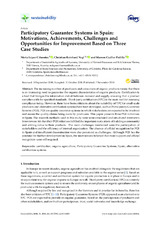Participatory Guarantee Systems in Spain: Motivations, Achievements, Challenges and Opportunities for Improvement Based on Three Case Studies
Autor
López Cifuentes, Marta
Reinhard Vogl, Christian
Cuéllar Padilla, María del Carmen
Editor
MDPIFecha
2018Materia
CertificationOrganic agriculture
Participatory Guarantee Systems
Spain
Alternative certification systems
METS:
Mostrar el registro METSPREMIS:
Mostrar el registro PREMISMetadatos
Mostrar el registro completo del ítemResumen
The increasing number of producers and consumers of organic products means that there is an increasing need to guarantee the organic characteristics of organic products. Certification is a tool that bridges the information deficit between demand and supply, ensuring that a product complies with the specified standards. Third-party certification (TPC) is the main tool for assessing compliance today. However, there have been criticisms about the suitability of TPC for small-scale producers and alternative certification systems have been developed, such as Participatory Guarantee Systems (PGS). PGS are quality assurance systems in which stakeholders are expected to be involved and assure the quality claims being made by producers. This paper presents three PGS initiatives in Spain. The research methods used in this study were semi-structured and structured interviews. Interviewees felt that their PGS initiatives fulfilled the important motivations of building a community and adding value to their products. The main challenges mentioned were the participation of stakeholders and the efficiency of internal organization. The absence of official recognition for PGS in Spain and insufficient dissemination were also perceived as challenges. Although PGS has the potential for further development in Spain, the interviewees believed that more support and official recognition were still required.

